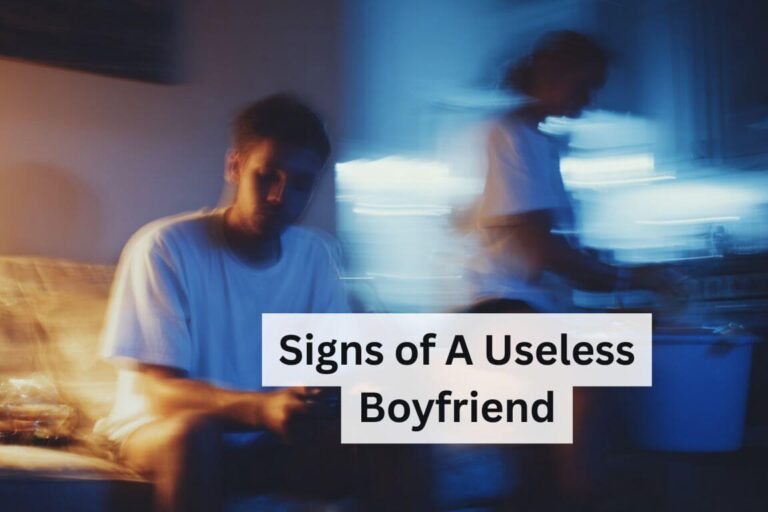Sometimes we find ourselves questioning whether the person we’re with truly adds value to our lives. That nagging feeling in your gut might be trying to tell you something important.
While every relationship has its ups and downs, certain patterns can indicate that your partner might not be the right fit for your future happiness and growth.
Understanding these warning signs can help you make informed decisions about your romantic life and protect your emotional well-being.
1. He’s Always the Victim in Every Story
When someone consistently portrays themselves as the wronged party in every situation, it reveals a troubling pattern.
This type of person rarely takes accountability for their actions and always has an elaborate explanation for why circumstances conspired against them.
Whether it’s losing a job, conflicts with friends, or even arguments in your relationship, he somehow manages to twist the narrative so that he’s the innocent victim.
His ex-girlfriend was “crazy,” his boss was “unfair,” and his friends “didn’t understand” him. The common denominator in all these stories is never him.
This victim mentality becomes exhausting because it means you’re constantly walking on eggshells, trying not to become the next person who “wronged” him.
More importantly, it indicates an inability to grow from mistakes or take responsibility for personal development.
A mature partner acknowledges their role in conflicts and works toward solutions rather than dwelling on how the world has mistreated them.
When someone cannot see their own contributions to problems, they cannot effectively work to resolve them or prevent similar issues in the future.

2. He’s Emotionally Unavailable When It Matters Most
Emotional availability isn’t just about being physically present; it’s about being mentally and emotionally engaged in your relationship.
When life gets challenging or when you need genuine support, he seems to vanish emotionally.
This might manifest as him becoming distant when you’re dealing with stress at work, brushing off your concerns as “not that serious,” or changing the subject whenever conversations turn emotional.
He might be great at surface-level interactions but struggle to provide the deeper connection that sustaining relationships require.
True partnership means being there for each other during both celebrations and struggles. If he can only show up for the good times but disappears when you need emotional support, it suggests a fundamental inability to engage in mature, committed relationships.
You might notice that conversations about feelings make him uncomfortable, or he might minimize your emotions by suggesting you’re being “too sensitive” or “overreacting.”
This emotional unavailability often stems from his own inability to process and handle emotions, which becomes your burden to carry.
3. He’s Financially Irresponsible and Unreliable
Financial responsibility isn’t just about having money; it’s about demonstrating maturity, planning abilities, and consideration for the future.
Someone who consistently makes poor financial decisions or expects others to cover their expenses shows a lack of basic adult functioning.
This might include frequently borrowing money without paying it back, making impulsive purchases while complaining about being broke, or having no savings or financial goals.
He might also display an entitled attitude toward money, expecting you to pay for dates or split bills unfairly based on arbitrary reasons.
Financial irresponsibility often extends to other areas of life, indicating poor decision-making skills and lack of self-control.
If he cannot manage his own finances, it raises serious questions about his ability to contribute to a shared future or handle adult responsibilities.
Moreover, financial stress is one of the leading causes of relationship conflict. Someone who brings chaos to this area of life will likely create ongoing tension and instability in your relationship.
4. He’s Inconsistent with Communication and Effort
Consistency in communication and effort demonstrates respect, interest, and emotional maturity.
When someone’s attention and effort fluctuate dramatically without explanation, it creates an unstable foundation for relationship building.
One week he might text you constantly and make elaborate plans, while the next week he barely responds to messages and seems completely disinterested.
This hot-and-cold behavior leaves you constantly guessing about where you stand and what to expect.
Healthy relationships thrive on predictability and reliability. When you cannot count on someone to maintain basic communication standards or follow through on plans, it becomes impossible to build trust and security.
This inconsistency often reflects deeper issues with commitment, emotional regulation, or genuine interest in the relationship.
Someone who truly values your connection will make consistent effort to maintain it, regardless of their mood or other distractions.
5. He’s Disrespectful Toward Your Boundaries and Values
Respect for boundaries is fundamental to healthy relationships. When someone consistently pushes against your limits or dismisses your values, they’re showing a concerning lack of regard for your autonomy and well-being.
This might involve pressuring you to do things you’re uncomfortable with, making jokes that cross your stated boundaries, or arguing with your personal values and beliefs.
He might frame boundary-pushing as “helping you grow” or suggest that your limits are unreasonable.
Someone who truly cares about you will respect your boundaries even when they don’t fully understand them.
Healthy partners work to understand and honor each other’s limits rather than constantly testing or challenging them.
Disrespect toward boundaries often escalates over time. What starts as “harmless” boundary-pushing can develop into more serious violations of your comfort and safety.
This pattern reveals someone who prioritizes their own desires over your well-being.

6. He’s Unable to Handle Conflict Constructively
Conflict resolution skills are crucial for relationship success. Someone who cannot navigate disagreements in a healthy way will create ongoing tension and prevent relationship growth.
This might manifest as shutting down during arguments, becoming aggressive or hostile, giving you the silent treatment, or refusing to discuss problems until they “blow over.”
He might also engage in destructive behaviors like name-calling, bringing up past issues, or making threats during disagreements.
Mature individuals understand that conflict is normal and can be productive when handled properly. They’re willing to listen, compromise, and work toward solutions rather than winning or avoiding the situation entirely.
Poor conflict resolution skills indicate emotional immaturity and suggest that future disagreements will be similarly unproductive.
Without the ability to work through problems together, relationships cannot evolve or deepen over time.
7. He’s Unsupportive of Your Goals and Ambitions
A quality partner celebrates your successes and supports your aspirations.
Someone who consistently undermines your goals, shows little interest in your achievements, or actively discourages your ambitions is not invested in your happiness and growth.
This might include making dismissive comments about your career goals, showing no interest in your hobbies or passions, or becoming threatened by your successes.
He might also fail to celebrate your achievements or seem uncomfortable when you receive recognition or opportunities.
Supportive partners want to see each other thrive and succeed. They offer encouragement during challenging times and celebrate victories together.
When someone cannot genuinely support your growth, it suggests either insecurity on their part or lack of genuine care for your well-being.
This lack of support can be particularly damaging over time, as it can cause you to doubt your own abilities or scale back your ambitions to avoid conflict in the relationship.
Moving Forward with Clarity
Recognizing these patterns isn’t always easy, especially when you’re emotionally invested in someone.
However, acknowledging these red flags early can save you from investing more time and energy in a relationship that isn’t serving your best interests.
Trust your instincts when something feels off. Your emotional well-being and future happiness are worth protecting.
While everyone has flaws and areas for growth, the patterns described above represent fundamental issues that typically require significant personal work to address.
Remember that you deserve a partner who adds value to your life, supports your growth, and treats you with consistent respect and consideration.
Don’t settle for someone who brings drama, instability, or negativity to your world simply because you’re afraid of being alone or starting over.
Quality relationships are built on mutual respect, consistent effort, emotional availability, and shared commitment to growth.
When these elements are missing, you’re not in a partnership but rather a one-sided arrangement that will ultimately leave you feeling unfulfilled and undervalued.
Take time to reflect honestly on your current situation. If multiple signs resonate with your experience, consider having an open conversation about your concerns.
However, remember that you cannot change someone who doesn’t recognize the need for change or isn’t committed to personal growth.
Your future self will thank you for having the courage to choose relationships that truly enhance your life rather than complicate it.


